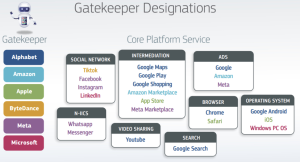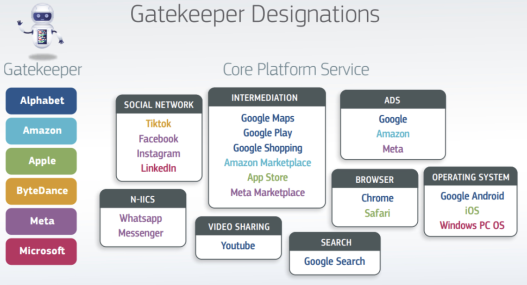
THE SIX GATEKEEPERS MUST COMPLY WITH THE DIGITAL MARKETS LAW AS OF TODAY
By Aquí Europa
As of today, March 7, 2024, Apple, Alphabet, Meta, Amazon, Microsoft and ByteDance, the six gatekeepers appointed by the European Commission in September 2023, must fully comply with all obligations under the Digital Markets Act (DMA).
(For the Commission, gatekeepers are the large technology companies that act as key gateways between businesses and consumers by providing core platform services.)
As reported today by the Commission, the DMA aims to make EU digital markets more competitive and fair. It establishes new rules for 10 defined core platform services, such as search engines, online marketplaces, app stores, advertising and online messaging, and grants new rights to European businesses and end-users.
EU-based business users that rely on the services offered by the six gatekeepers to reach their customers will enjoy new opportunities starting today. For example, business users will be able to:
- Benefit from a fair and level playing field when competing with gatekeeper services on their platforms.
- Request interoperability with gatekeeper services to offer new innovative services.
- Sell their applications through alternative channels other than gatekeeper app stores.
- Access data generated by your activities on gatekeeper platforms.
- Promote offers and enter into contracts with customers outside the gatekeeper’s platform.
- Reclaim their power of choice and not be trapped in the gatekeepers’ default options, e.g. by choosing alternative app stores and services to those offered by the gatekeepers.
- Gain better control over your data by being able to decide whether the gatekeeper can link your accounts and thus track and combine your personal data across different services.
- Easily obtain, transfer and use data from one service or application to another, allowing you to seamlessly back up data and move between different services.
- Use alternative electronic identification or payment services within the application.



